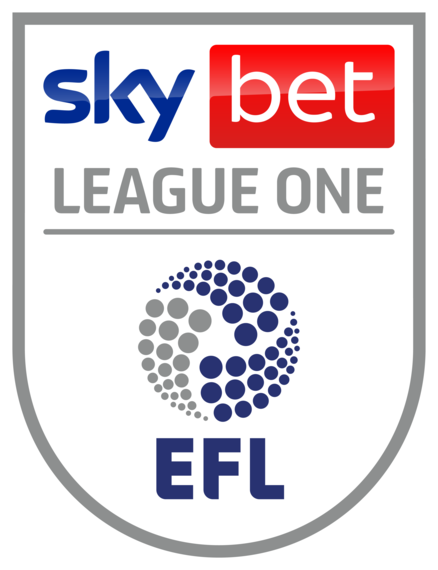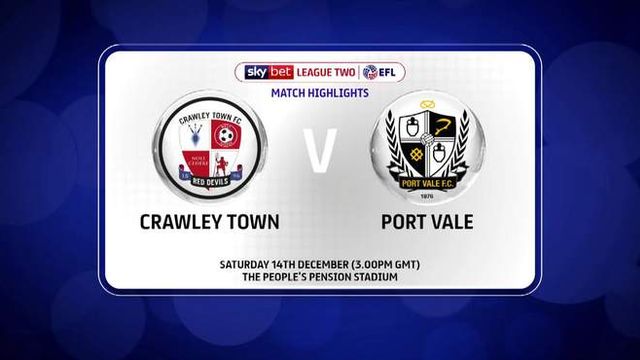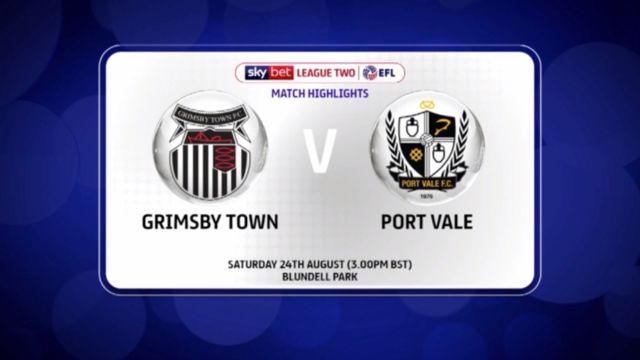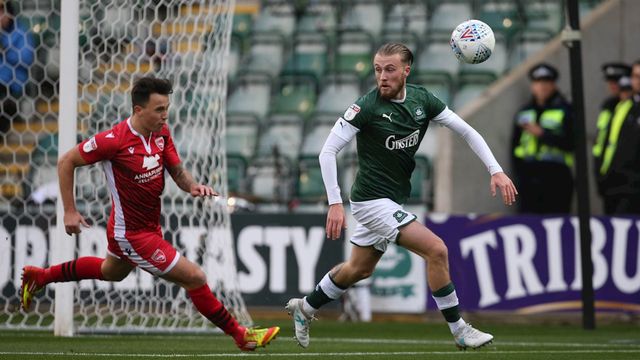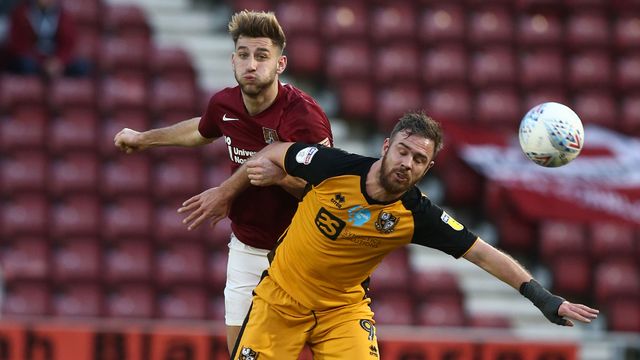
Port Vale Football Club was formed in 1876 and took its name from the venue of the inaugural meeting at 'Port Vale House' situated in a suburb of Stoke-on-Trent. Upon moving to Burslem in 1884 the Club changed its name to 'Burslem Port Vale' and after several seasons in the Midland League became founder members of the Football League Division Two in 1892.
The first few years, however, were a struggle and in 1896 the Club failed to gain re-election and returned to the Midland League. Following an F.A Cup victory in 1898 over Sheffield United from Division One the Club once again returned to Division Two. It was still an uphill battle though, and in 1907 the Club were forced to resign due to financial difficulties and almost went into oblivion. The prefix 'Burslem' was dropped from the name as a new ground several miles away was acquired. In October 1919 after eight seasons in the Central League the Club returned in dramatic circumstances to the Football League. Following the expulsion of LeedsCity for making illegal payments the Club was elected to take over their remaining fixtures and responded by finishing in a creditable 13th place.
In 1928-29 the Club experienced relegation for the first time, but bounced back to win the Third Division (North) Championship and in 1931 went on to finish in 5th place in Division Two which still remains the Club's highest ever league position. The Club was again relegated in 1936 and spent the next 18 years fluctuating between Third Divisions North and South due to its central geographical location.
In 1950 the Club moved to its present home at ValePark which due to its size and the planned developments became known as 'The Wembley of the North'. 1953-54 saw the best season in the Club's history as it romped to the Third Division (North) Championship, losing only three games and conceding just twenty-one goals, whilst also reaching the semi-finals of the F.A Cup only to lose controversially to West Bromwich Albion. The stay in Division Two lasted only three years until 1957, then going straight down to become founder members of the newly formed Fourth Division. It turned out to be a successful season though as a Club record 110 goals helped to take the title.
The next few seasons saw the F.A Cup providing the highlights as the 5th Round was reached in 1960 and 1962 with 4th Round matches in both 1963 and 1964 with a draw at Champions elect Liverpool in the latter campaign. Relegation back to Division Four in 1965 and a barren spell followed with the ignominy of having to seek re-election in 1968.
Gordon Lee became manager and put together a promotion winning team in 1970 and then after again reaching the 5th Round of the F.A Cup in 1977 were relegated the following season. The Club continued to sink to its lowest ever position in 1980 and this saw the arrival of John Rudge as coach to manager, John McGrath. A promotion campaign was mounted in 1982-83 to revive the Club's fortunes but unfortunately a year later relegation saw the Club going straight back down with John Rudge taking over the reins as manager for the first time. Promotion was again achieved in 1986 and striker Andy Jones rose to International status following his 37 goal haul in 1987.
A major turning point in the Club's history arrived in January 1988, when a late winner in the F.A Cup against non-league Macclesfield Town earned a plum 4th Round home tie against Tottenham Hotspur. When Port Vale won 2-1 to earn national recognition the Club's fortunes appeared to take off. In 1988-89 a third place and promotion via the play-offs took the Club back to Division Two for the first time in thirty-two years. This rekindled the long awaited local derbies with Stoke City and all went well until midway through the 1991-92 season when a run of eighteen games without a win ended in relegation.
Fortunately the Directors stood by John Rudge and in the 1992-93 season after a long battle finished in third place on eighty-nine points, a record total for a team failing to gain promotion. This meant a second participation in the play-offs but it ended in defeat at Wembley against West Bromwich Albion. The previous weekend yielded a never-to-be-forgotten day though, as the Club's first ever Wembley visit ended in victory in the Autoglass Trophy Final backed by over 25,000 supporters to climax a run that included a 1-0 win at holders, Stoke City. Goals by Paul Kerr and Bernie Slaven in the final securing a 2-1 victory over Stockport County.
In 1993-94 the Club finished second in Division Two to gain automatic promotion and in the 1995-96 season played a record sixty-two games which saw them reach the Anglo-Italian Cup Final at Wembley and the 5th Round of the F.A Cup. In the latter, victory over reigning Cup holders, Everton was rewarded by Sponsor, Littlewoods presenting the Club with a special 'Giantkillers' award. Despite being quoted as pre-season relegation favourites in 1996/97, we confounded their critics to finish in our highest position since 1931.
1997/98 will be best remembered for the last match victory at Huddersfield that saw the Club safe from the threat of relegation and the exciting F.A Cup games versus eventual double winners Arsenal, where only a penalty shoot out separated the teams. In 1998/99 the Club again retained our First Division status at the death, this time under new manager, Brian Horton. The continual struggle against the odds eventually caught up with the club and in May 2000 Vale suffered relegation to the second division. Expectations for the new season among supporters were high but the Valiants had a poor first half of the season which included a first round defeat in the Worthington Cup against Chester City.
Worse was to come in November 2000 when Vale were knocked out of the first round of the FA Cup by non-league Canvey Island. The second half of the season saw a complete turn around in preformances and results on the field that saw Vale rise from the depths of the relegation zone to a respectable 11th position. Records for consecutive away wins were equalled which is more amazing when you consider that in the previous two seasons Vale had won just 2 away games. The Valiants remained unbeaten for a total of 16 consecutive games which was eventually haled by a narrow 1-0 defeat away to league leaders Millwall.
The highlight of the season though, was without a doubt, the victory over Brentford in the LDV Vans Trophy at the Millennium Stadium, Cardiff on 22/04/01 with a 2-1 over the Bees courtesy of goals from Bridge-Wilkinson and Brooker. Vale's run in the competition started with a 3-0 win over Notts County at Vale Park on 09/01/01 which in itself saw the end of what must be an unwanted record. Vale had failed to win a single cup competition of any sorts for the previous 53 months. We progressed to the final with further wins over Chester City, Darlington, Stoke City and Lincoln City.
The 2002/2003 season was always going to be a struggle, with finances dictating the situation and the club unable to afford a squad large enough to make any headway in Division Two. In December, the club was forced to go into administration and unfortunately, staff cuts duly followed, with Assistant Manager Mark Grew and Chief Scout Ray Williams the big name casualties.
Chairman Bill Bell eventually made way for the new owners, Valiant 2001 and on the field of play, Brian Horton's men managed to see off the threat of relegation - but only just! New Chairman Bill Bratt warned supporters and staff alike that things would not get better overnight and the club had a transfer embargo slapped on them to make things even more difficult.
The start of the 2003/2004 season saw expectations rise sharply, as the side started off really well and we were soon sitting pretty at the top of Division Two. Steve McPhee had managed only three goals the previous season, but it was soon evident the young Scot was about to make a mockery of that derisory total. The whole place had been given a massive lift by the new owners, but their hands were tied and there was little they could do which would allow Brian Horton to add to the squad.
We were still in with a shout of a play off place, when the manager and the club, perhaps a little surprisingly, parted company and the board wasted no time in replacing him with crowd favourite Martin Foyle. Foyle himself wasted no time in bringing in another former favourite, Dean Glover, who had left to join Stone Dominoes the previous season.
In the 2006-2007 season we got off to a terrific start, winning our opening four league matches, and then following that up by beating Championship outfit Preston North End in the Carling Cup. A drop in form and a larger than expected injury list took its toll, though there was further Carling Cup success as we saw off two more Championship clubs, in QPR and Norwich, before going out of the competition at White Hart Lane. We actually took the lead against Tottenham when top scorer Leon Constantine found the net, but the home side came back to force extra time and tired legs saw the Valiants concede a further two goals before returning to the Potteries with heads held high.
Following a poor start to the 2007-2008 season, Manager Martin Foyle left the club by mutual consent and Dean Glover took over the reigns as Caretaker manager, until a new man was appointed. The new manager was Lee Sinnott, who had previously managed Farsley Celtic, where he had successfully guided the club into the Blue Square Premier League. Unfortunately there was little he could do, given the lack of resources and the failings of the squad he inherited, to prevent the club from slipping into League Two.
Sinnot started the 2008-2009 in charge, but by November was removed from his post after a poor start to the season. Dean Glover took over the managerial hot-seat until the end of the season, when under pressure from supporters, it was decided he and he and the club would go their separate ways.
During the summer of 2009, the vacancy was advertised, and after much speculation Micky Adams - a manager with Premier League experience – was appointed as Vale boss. In his first season he transformed the club and the team narrowly missed out on the play-offs, giving everybody great optimism at the beginning of the 2010-2011 season.
After much deliberation, Micky Adams later decided to join his boyhood club, Sheffield United, but within a few months he was back at the helm. Sadly, with Vale looking real contenders for the play-offs during the 2011-2012 season, the club went into Administration and a really tough time followed for the club.
The club entered the 2012-2013 still in administration, but started the season in remarkable fashion, goals coming thick and fast and points building up nicely. When the club cam out of administration in November, remarkably, they were by then amongst the promotion favourites. This continued right to the end of the season when they were promoted in third place behind Gillingham and Rotherham United.
Micky Adams successfully kept Vale in League One during the 2013/14 season, but would go on to resign the following season in September 2014. He would be replaced by Rob Page who enjoyed almost two seasons at Vale Park, leading the club to a play-off push during the 2015/16 season, but ended up falling just short.
At the start of the 2016/17 season, Vale had a new man in charge, as the club looked to Bruno Ribeiro to bring a new style of football to Vale. Bruno would bring in 19 players during his first summer window and things started brightly, with Vale in the play-offs in October. However, a run of poor results and the Valiants began to slide down the wrong end of the table and Ribeiro ultimately resigned on Boxing Day 2016 and was replaced by Michael Brown in a caretaker role. Brown did all he could to try and keep Vale in League One, but the club were eventually relegated on the final day of the season after drawing 0-0 with Fleetwood Town.
The club had a poor start to the 2017/18 campaign which meant the departure of Michael Brown and the arrival of former hero as a player, Neil Aspin, taking over as manager. The club’s greatest ever manager, John Rudge, also returned as a football adviser. The team avoided relegation with the highlight being a 4-0 victory over champions elect Luton Town.
2018/19 was also a struggle and Aspin left in January 2019, being replaced by John Askey, son of the club’s former 1950’s player Colin. The club again finished 20th for the second successive season but the best news came in May 2019. The club was bought by Carol and Kevin Shanahan, owners of Synectics Solutions, a company based next door to Vale Park.
Everything improved on and off the field and the team went on to finish 8th, missing the League Two play offs by just a point after the season was ended early due to the Coronavirus pandemic. The main highlight was an FA Cup trip to the Etihad Stadium to play Man City, and the 8,000 Vale fans in the 53,000 crowd will never forget the moment when Tom Pope equalised before we were beaten 4-1.
Since March 2020, when the first Coronavirus lockdown was announced, the Port Vale Community Hub has been helping communities across Stoke-on-Trent – delivering more than 170,000 meals to local families in need.

